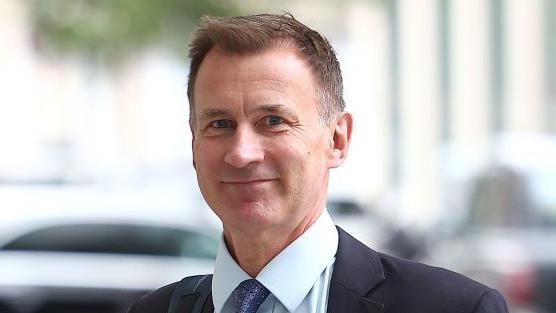Hunt accuses Labour of cronyism over job for donor

Jeremy Hunt challenged Rachel Reeves over the appointment of a Labour donor in the Commons
- Published
Shadow chancellor Jeremy Hunt has accused Labour of "cronyism", after a party donor was given a senior civil service role in the Treasury.
Ian Corfield - who previously donated ┬г20,000 to Labour MPs, including ┬г5,000 to now-Chancellor Rachel Reeves last year - was given a temporary job focused on organising an international investment summit planned for October.
Ms Reeves said the donation was declared over a year ago "in the proper way" and all the questions asked by the civil service when the appointment was made were answered.
It is understood Mr Corfield has since moved to an unpaid advisory role.
- Published21 August
- Published15 August
Raising the appointment during Treasury questions in the Commons, Mr Hunt said: "When the chancellor was sitting on this side of the House she repeatedly attacked cronyism."
He asked whether Ms Reeves told the Treasury's permanent secretary - the department's most senior civil servant - about Mr Corfield's donation to her before he was appointed as a director.
In response, Ms Reeves said: "All governments appoint people to the civil service.
"The donation from Ian Corfield was declared over a year ago in the proper way and we answered all the questions in the right way that the civil service asked when we made that appointment.
"Ian Corfield is supporting this government in hosting the international investment summit which is going to bring hundreds of global investors to the UK next month."
Hitting back, Mr Hunt said: "I think that means the answer is no."
He suggested this could be a breach of the Ministerial Code, which requires ministers to ensure no conflict arises between their public duties and private interests.
"Why is cronyism wrong under the Conservatives but acceptable under Labour?" he asked.
However, Ms Reeves accused her predecessor of having a "brass neck" after "the appointments and the partying at Downing Street that we saw under the last Conservative government, and billions of pounds of contracts handed out to friends and donors of the Conservative Party".
Rachel Reeves became chancellor in July
Mr Cofield was appointed as director of investment at the Treasury without going through the usual application process, which is allowed when an open competition is not feasible, for example because of an urgent need to recruit or a role's short duration.
There are no rules automatically preventing someone being appointed to a civil service role because of a political donation, but candidates are told they must understand the requirement to act impartially if appointed.
The Conservatives have criticised Labour for appointing a number of individuals with connections to the Labour Party to civil service roles.
Emily Middleton was named a director general in the Department for Science, Innovation and Technology, where the secretary of state is Peter Kyle.
She was previously a partner at consultancy firm Public Digital, which paid for her secondment to Mr Kyle's office in opposition - a donation in kind of more than ┬г65,000. She was also seconded to think tank Labour Together.
The Tories have also pointed to the appointment of Jess Sargeant, who previously worked for Labour Together, to a senior role in the Cabinet Office as further evidence the government is undermining civil service impartiality.
Whitehall's recruitment watchdog, the Civil Service Commission, is conducting a review of appointments made by the new Labour government outside normal processes, following recent criticism.
Prime Minister Sir Keir Starmer has rejected accusations of cronyism, saying "we want the best people in the best posts".